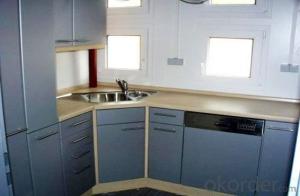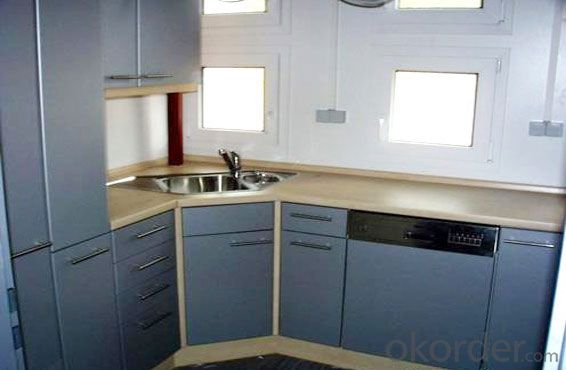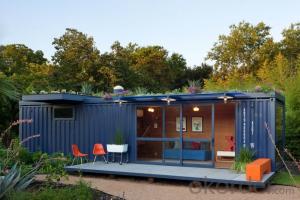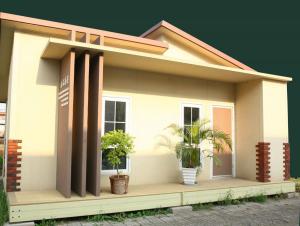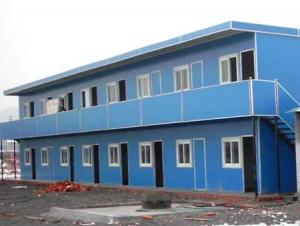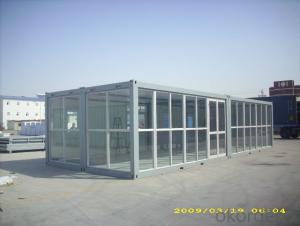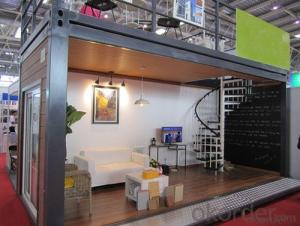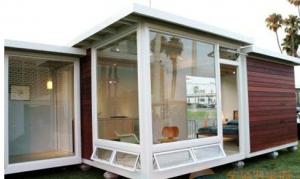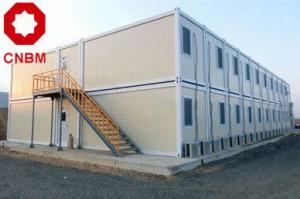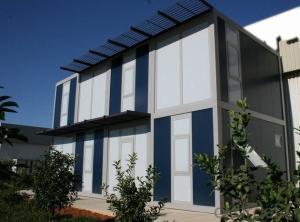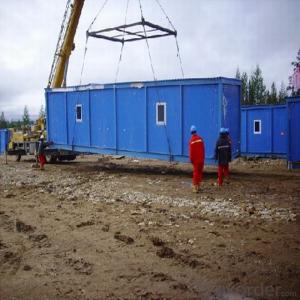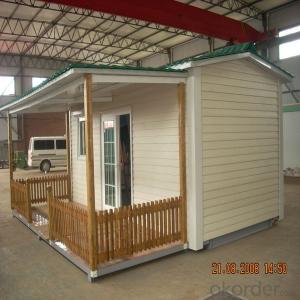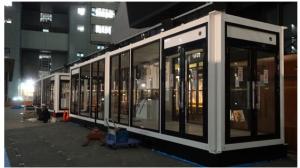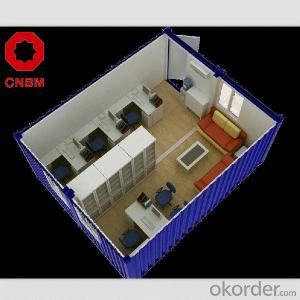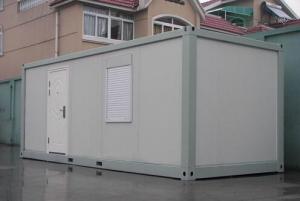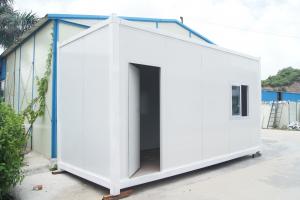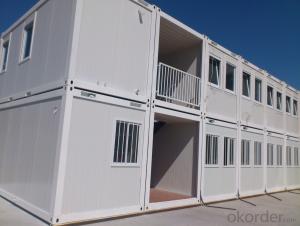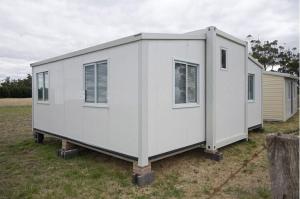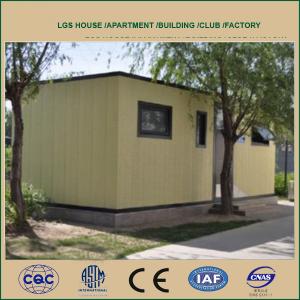House Container,container house good price
- Loading Port:
- Shanghai
- Payment Terms:
- TT OR LC
- Min Order Qty:
- 4 set
- Supply Capability:
- 200 set/month
OKorder Service Pledge
OKorder Financial Service
You Might Also Like
Specification
Container House
Easy Transportation, Fast Construction, Flexible Combination, Cost Saving, Green&Sustainable
The units are suitable for:
• Accommodation units • Office / Hotel • Large Camps
• Temporary Housing • Exhibitions • Construction sites
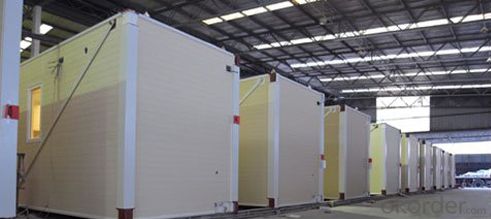
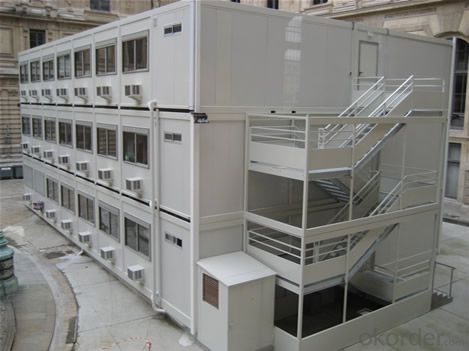
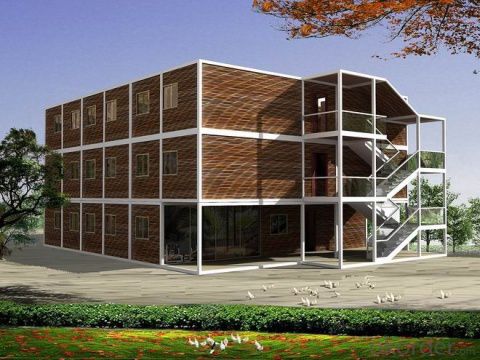
1. The benefits of Container House
Perfect for modular/prefab site offices,cabins,warehouse,villa,toliet,shop,hotel,camp,office
Efficient, low cost designs that can be customized for end user requirements
Easy for low skilled workers to assemble
The light steel frame structure is strong and reliable
Many modular homes can be stacked and linked together to create more space
Neat inside: plumbing and wires are hidden into the sandwich panel
2. Certificates:
ISO9001, ISO14001, CSA(Canadian Standards Association)
3. Specification:
Frame
.Cold formed 3-4mm Steel Profile
. Wind resistance capacity>120km/h,
. Seismic resistance capacity > grade 8
Floor
·0.4 mm flat galvanized steel sheet
·50mm non combustible mineral wool
·18mmplywood panel
·Customized PVC floor
Roof
.0.5mm galvanized &painted steel sheet
·50mm non combustible mineral wool
·50mm Sandwich panel
·one set CE electronic installation
Door
·Single fold, 40mm thick
·Insulated with PL (polystyrene)
·Opening dimensions of 808×2030mm, with a handle lock with 3 keys.
·Net opening dimensions: 754 x 1985 mm.
Wall Panel
60mm EPS /PU/Rock wool Sandwich panel
Window
·Made of PVC, white color, with dimensions 800×1100mm,
glazed with double layer glass with sliding mechanism (one side fixed
and one sliding).
More extra types chosen in term of your specific needs.
4.The cabin can be dis-assemebled for transport.
4 units/bundle, the bundle is the same dimension as 20'GP container .
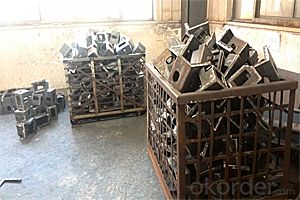
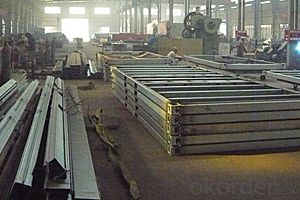
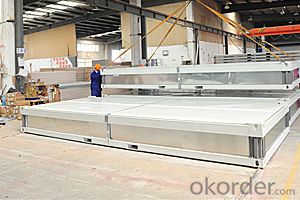
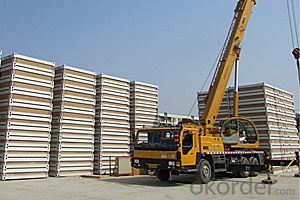
- Q: Are container houses suitable for small business offices?
- Yes, container houses can be suitable for small business offices. Container houses are cost-effective, easily customizable, and can be quickly set up. They provide a unique and modern aesthetic, along with the ability to expand or relocate the office if needed. Additionally, container houses are environmentally friendly as they repurpose shipping containers, making them a sustainable choice for small businesses.
- Q: Are container houses suitable for building on sloped terrain?
- Yes, container houses are suitable for building on sloped terrain. Container houses are known for their versatility and adaptability, making them an ideal choice for various landscapes, including sloped terrains. One of the main advantages of container houses is their ability to be easily stacked or placed on different levels, allowing for a seamless integration with the natural contours of the land. This means that container houses can be built on sloped terrains without the need for extensive modifications or costly foundation work. In addition, container houses can be customized to fit the specific needs of the sloped terrain. For instance, the containers can be strategically positioned to take advantage of the natural views and sunlight, creating a unique and sustainable living space. Furthermore, container houses can be designed with various access points, such as stairs or ramps, to ensure easy and safe movement on the sloped terrain. Another important factor to consider is the durability of container houses. Made from strong steel structures, container houses are designed to withstand extreme weather conditions, including on sloped terrains where erosion and shifting of the land may occur. This ensures that the house remains stable and secure over time, providing a long-lasting solution for building on sloped terrain. Overall, container houses offer a practical and efficient solution for building on sloped terrain. With their versatility, adaptability, and durability, container houses can create unique and sustainable living spaces that embrace the natural features of the land.
- Q: Can container houses be designed for multi-story living?
- Indeed, multi-story living can indeed be accommodated by container houses. Although shipping containers are typically employed as single-story edifices, they possess the potential to be stacked and integrated to produce multi-story container houses. This facilitates the optimal utilization of vertical space and enables the creation of more spacious living quarters within a condensed footprint. By implementing suitable structural reinforcement and engineering techniques, container houses can be securely stacked to form multi-level living spaces. Furthermore, the modular characteristics of containers render the process of adding or removing units relatively effortless, thereby bestowing flexibility and adaptability upon multi-story designs.
- Q: Can container houses be designed with a garage?
- Yes, container houses can be designed with a garage. Container houses are versatile and can be customized to meet individual needs and preferences. By strategically planning the layout and design, it is possible to incorporate a garage space within a container house. This can be achieved by either extending the container structure to accommodate the garage or by creating a separate container module specifically for the garage. The size and design of the garage can be tailored to fit the available space and intended use, whether it's for parking vehicles, storage, or a workshop. With proper planning and design, container houses can definitely be equipped with a functional garage.
- Q: Are container houses suitable for individuals who prefer a sustainable lifestyle?
- Yes, container houses are well-suited for individuals who prefer a sustainable lifestyle. These houses are made from repurposed shipping containers, reducing waste and promoting recycling. Additionally, they often incorporate sustainable features such as efficient insulation, solar panels, and rainwater harvesting systems, making them energy-efficient and eco-friendly. Container houses also provide an opportunity for minimalistic living, encouraging individuals to reduce their carbon footprint and embrace a more sustainable way of life.
- Q: Can container houses be built with a home office or study area?
- Yes, container houses can definitely be built with a home office or study area. One of the great advantages of container houses is their versatility and adaptability. They can be easily modified and customized to suit the specific needs and preferences of the homeowner. To create a home office or study area in a container house, the container can be divided into different sections or rooms. The partition walls can be added to create a separate space for work or study. These walls can be made of various materials, such as drywall or plywood, depending on the desired aesthetic and functionality. Additionally, windows can be strategically placed to provide ample natural light, which is essential for a productive work or study environment. Adequate insulation can be installed to ensure a comfortable temperature throughout the year. Furthermore, container houses can also be equipped with the necessary electrical outlets and internet connections to support the operation of computers, printers, and other office or study equipment. Overall, container houses offer a great opportunity to have a dedicated home office or study area. With proper planning and design, these spaces can be functional, comfortable, and conducive to productivity and focus.
- Q: Can container houses be built with sustainable materials?
- Certainly, sustainable materials can indeed be used to construct container houses. The utilization of shipping containers as the foundation for homes is already an environmentally conscious approach, as it repurposes these steel structures that would otherwise be wasted. Furthermore, sustainable materials can be integrated into the construction of container houses to further enhance their eco-friendliness. For instance, container walls, floors, and ceilings can be insulated using sustainable insulation materials like recycled denim, cellulose, or wool. This insulation reduces the energy required for heating and cooling. Additionally, renewable and low-impact flooring options such as bamboo or cork can be employed. Windows and doors made from recycled materials, which are energy-efficient, can be installed. Moreover, the use of low-VOC paints and finishes can improve indoor air quality. Furthermore, container houses can become more self-sufficient and reduce reliance on fossil fuels by incorporating renewable energy systems like solar panels. Rainwater harvesting systems can also be implemented to collect and reuse water, thereby reducing water consumption and lessening the strain on local water sources. Through the adoption of these sustainable materials and practices, container houses can significantly decrease their environmental impact and contribute to a more sustainable and eco-friendly housing solution.
- Q: Can container houses be designed with a basement?
- Certainly, container houses have the capability of being designed with a basement. Although container homes are typically constructed using recycled shipping containers, it is still possible to include a basement in their design. The basement can serve a variety of purposes, including providing extra living space, storage, or even serving as a shelter during storms. In order to create a container house with a basement, the containers are typically placed on a foundation, and the basement is constructed underneath them. This process requires careful planning and engineering to ensure that the structure remains stable and waterproof. Furthermore, the design of the basement may need to be modified to accommodate plumbing and electrical systems, ventilation, and natural light sources. Nevertheless, with the appropriate expertise and construction techniques, container houses can indeed incorporate basements, thereby adding another level of functionality and adaptability to these distinctive and environmentally friendly homes.
- Q: How long do container houses last?
- Container houses are designed to be durable and long-lasting structures. With proper maintenance and care, a container house can last for several decades. The lifespan of a container house primarily depends on various factors such as the quality of the container, the environment it is placed in, and the level of maintenance it receives. The quality of the container itself plays a crucial role in determining its lifespan. High-quality containers made of corten steel are more resistant to corrosion and are built to withstand harsh weather conditions. These containers can last for up to 25 years or even more. On the other hand, lower quality containers may deteriorate faster and may require more frequent repairs and maintenance. The environment in which the container house is placed also affects its lifespan. Container houses in coastal areas or regions with high humidity levels are more prone to corrosion due to the presence of saltwater or moisture in the air. Regular inspections and preventive measures like applying anti-corrosive coatings can significantly extend the lifespan of the container house in such environments. Proper maintenance is crucial for ensuring the longevity of container houses. Regular inspections of the structure, including checking for any signs of rust or structural damage, can help identify and address potential issues before they become major problems. Additionally, keeping the container house clean and free from debris can prevent moisture buildup and further protect the structure. Overall, container houses can last for many years if they are constructed with high-quality containers, placed in suitable environments, and receive proper maintenance. With the right care, these innovative and sustainable housing solutions can provide comfortable and durable living spaces for an extended period.
- Q: Can container houses be built with a washer and dryer?
- Yes, container houses can be built with a washer and dryer. While the space inside a container may be limited, there are creative ways to incorporate these appliances into the design. For smaller container houses, a combination washer and dryer unit, commonly known as a washer-dryer combo, can be installed to save space. This type of unit allows both washing and drying functions in a single appliance. Additionally, some container house designs include a separate laundry area or a designated space for a stackable washer and dryer setup. With careful planning and utilization of the available space, container houses can definitely accommodate a washer and dryer.
Send your message to us
House Container,container house good price
- Loading Port:
- Shanghai
- Payment Terms:
- TT OR LC
- Min Order Qty:
- 4 set
- Supply Capability:
- 200 set/month
OKorder Service Pledge
OKorder Financial Service
Similar products
Hot products
Hot Searches
Related keywords
